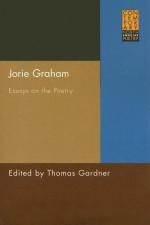|
This section contains 2,600 words (approx. 9 pages at 300 words per page) |

|
SOURCE: Ramke, Bin. “Critical Mass: Jorie Graham and James Tate.” Denver Quarterly 33, no. 3 (fall 1998): 100-07.
In the following review, Ramke offers a comparison of Graham's and James Tate's poetry, observing that both are uniquely American yet “seem sometimes to belong to no nation, no particular place.”
Coming to terms with contemporary poetry might imply attending to who's listening to whom, and asking to what extent “the poet” is, in a dancerly simultaneity, both audience and auditioner. We are all embedded in what we like to call “mass culture”—aswarm with vibrating molecules, with the variously-voiced desire and delirium of “the people.” Modern Americans produce amidst this din, and the nineteenth and twentieth centuries have been an era of the extensions of boundaries, an era of sometimes perverse inclusionism. One might occasionally feel overwhelmed by loss of boundary and by the sense of too many potential readers, and too...
|
This section contains 2,600 words (approx. 9 pages at 300 words per page) |

|


